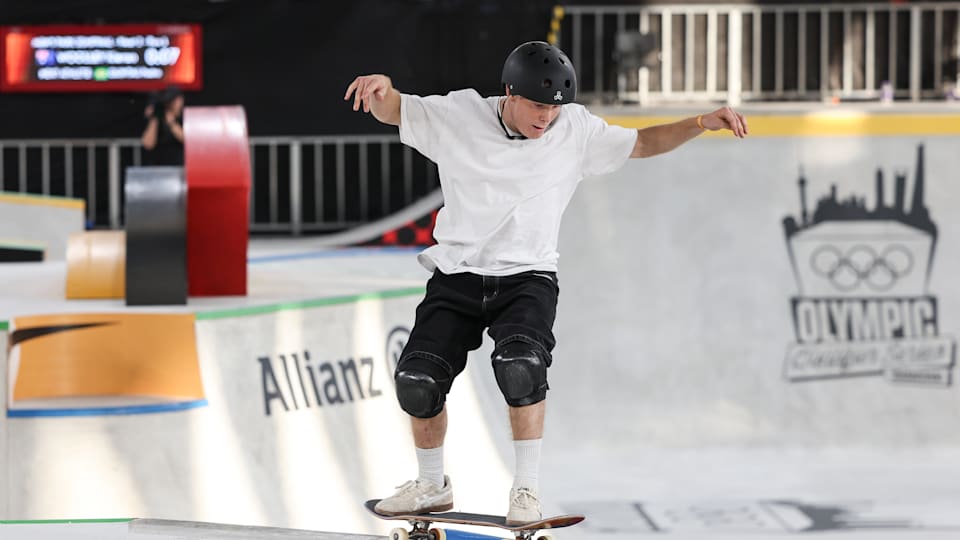Australia’s Kieran Woolley: "Olympic skateboarding progression is out of this world"
As the quality of men's park continues to soar Tokyo 2020 Olympian Kieran Woolley has continued to keep pace thanks to his own unique style. Now, the happy-go-lucky Aussie has his sights set on another Olympic tilt.

“Hopefully not this time,” Kieran Woolley says with an impish grin before erupting into a full belly laugh.
The Australian skateboarder is sitting for an interview with Olympics.com at the Olympic Qualifier Series in Shanghai and is responding to a question about Tokyo 2020, where he made headlines after accidentally taking out an unsuspecting cameraman at the end of one of his qualifying runs.
Would he do the same at Paris 2024, should he secure a quota? "You never know," he muses.
The answer, devilishly coy but also refreshingly authentic, speaks to the 20-year-old’s easygoing demeanour and the type of skater Woolley is. Just as he is honest away from the bowl, as he is on it. Forever hunting ways to blend street elements into his park runs as he otherwise tanks around the course, Woolley never deviates from his unique style.
“I try to skate the park in a way that I like to skate. If there's like a little rail or like a ledge I just mix the street in or like, try to do something unique and diverse and that always, like makes it a lot more fun for me.
“I’m trying to take it in my own direction. I am not doing all the kickflip 540s and stuff, but trying to throw my own little spin on things,” he continues.
“I’d rather just skate what I want to skate and skate how I want to skate and just put it out there. And if the judges like it, the judges like it. If they don't, they don’t.”
"Everybody has a shot"
While Woolley's words might sound like a challenge to the powers that be, for the most part, the judges have been largely on his side.
Since qualification started for Paris started in 2022, the Aussie skater has been a mainstay in finals. In the events across the two years he has entered, he has finished in fourth place on three occasions; a 15th place in San Juan is the only real ‘blemish’ on an otherwise fine record.
But Woolley’s results show more than just a remarkable level of consistency. They also speak to his role as a leading athlete in men’s park.
Such has been the levels of insurgency in the discipline, only four of the current top 10 ranked skaters, including Woolley, competed at Tokyo 2020. That the Australian is still healthily in the mix from one Olympics to the next points to how exciting a prospect the skater truly is.
“It’s kind of like open game,” Woolley says reflecting on how intense the competition has become in men’s park. “Like not just the finals, the semi-finals. Everybody has a shot and it's just kind of the best person on the day.
“There are so many people busting out new tricks every contest and stuff people have never seen in park contests before and it's pretty cool. The progression is out of this world.”
Australian skateboarder Kieran Woolley performing an invert at OQS Shanghai in May 2024.
“I just go out and have fun”
As for how Woolley is keeping pace, the answer, he says, comes mainly down to his disposition.
Though he admits to “definitely” being competitive, the secret to his success is through keeping everything light.
“When the best skating comes out for me personally is when I'm just having a good time and it feels like a jam session with my mates,” the Australian reflects. “I just go out and have fun.”
Spending most of his time in the United States training alongside world number one Tate Carew and others thanks to an athlete visa, it isn’t too much of a stretch for Woolley’s imagination. But even then he still finds himself sometimes getting sucked in by the pressure.
When that happens the Aussie turns to the person that knows him best. Woolley’s father, who first coaxed him onto a surfboard before supporting his transition into skating, is always on standby to give the athlete the pep talk he needs.
“I always go over to my dad and if he can see me feeling stressed he'll just say, 'Just remember to smile and have fun and go out there and do what you know how to do’,” Woolley shares. “He's just like, ‘Relax, you’ve got this. Go have fun’. And that's kind of sometimes what I need to hear.”
"It's still going and I'm frothing"
A smiling Woolley is an ominous one. But this time around, gratitude is also a guiding principle.
Six months ago while skating a spot in Helsinki, the Australian took a fall which caused his elbow to dislocate on both sides as well as shatter into five pieces.
The injury required surgery and kept Woolley off his board for the best part of six months. He was forced to skip the World Championships in Ostia, Rome as a result.
Showing off the scars that now circle his right arm Woolley reflected on the scale of the damage: “That was my first serious injury I would say,” he says frankly.
“I've broken my leg, but that was only like a month and a half, two months, and I've had a broken wrist. But you can skate with a broken wrist, and stuff that you can kind of move on from pretty quick. But, yeah, that one set me back. I was going to physio every day and the second I could I was in the gym every day, but it just took a while.”
Seeing friends out filming on trips and ripping in contests only tested his resolve further. With so much of skating focused on social media, escaping it while injured is no easy thing.
Though he did have to sit out on the action, Woolley is ultimately grateful for the break: “It was actually a really good reset. When I came back, I was fired up and just all I wanted to do was skating. And it’s still going and I’m frothing.”
OQS, Paris 2024 and the competition in wait
Ahead of the second leg of the Olympic Qualifier Series in Budapest, Woolley - ranked seventh in the World Skate rankings - is currently in the frame to secure a quota spot* for Paris 2024.
But even with less than 50 days to go, nothing is yet promised to anyone.
A storming performance in Shanghai by Olympic champion and fellow Aussie Keegan Palmer saw him overtake Woolley in the rankings. Underneath him sit Keefer Wilson and Ash Wilcomes in 11th and 23rd respectively.
With a maximum of three members per National Olympic Committee (NOC) permitted to compete in each skateboarding event, Woolley knows the job is not yet done.
“If you learn your stuff and the judges like it, then it's going to work out. Same with everybody. The Americans, Brazilians, and Spain coming in hot. It just depends. The points at these events are so severe. You can switch up; go from first to 20th, just like that.”
As for what it would mean to make a second Olympic appearance and become part of a select few to become skateboarding’s first two-time Olympians Woolley doesn’t shy away from the significance:
“Representing Australia already once was a dream opportunity. And I mean for some once-in-a-lifetime opportunity. It would be sick if I get to do it twice, for sure.”
*As National Olympic Committees have the exclusive authority for the representation of their respective countries at the Olympic Games, athletes' participation at the Paris Games depends on their NOC selecting them to represent their delegation at Paris 2024.

